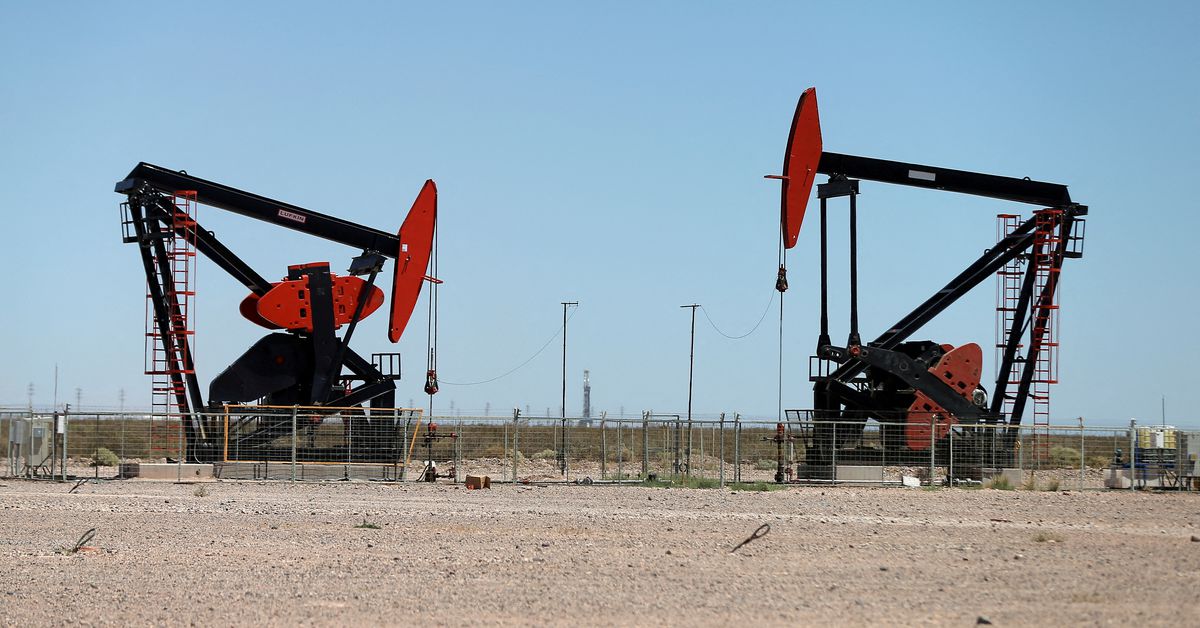Oil hit 7-year highs as tight supply bites

Summary Benchmarks jump to highest since October 2014
Middle East, Russia tensions add to supply concerns
Some OPEC+ sources say $100/bbl oil is possible
Goldman expects crude inventories to drop to lowest since 2000
NEW YORK, Jan 18 (Reuters) – Oil prices on Tuesday climbed to their highest since 2014 as investors worried about global political tensions involving major producers such as the United Arab Emirates and Russia that could exacerbate the already tight supply outlook.
The risk added a premium to prices during the session. Brent crude futures rose $1.03, or 1.2%, to settle at $87.51 a barrel. U.S. West Texas Intermediate (WTI) crude futures ended $1.61, or 1.9%, higher at $85.43 a barrel.
Both benchmarks touched their highest since October 2014, and some OPEC sources say $100-per-barrel oil is not out of reach. read more
Register now for FREE unlimited access to Reuters.com Register
Supply concerns mounted this week after Yemen’s Houthi group attacked the United Arab Emirates, escalating hostilities between the Iran-aligned group and a Saudi Arabian-led coalition. read more
After launching drone and missile strikes that set off explosions in fuel trucks and killed three people, the Houthi movement warned it could target more facilities, while the UAE said it reserved the right to “respond to these terrorist attacks.” read more
The strike on a leading Gulf Arab ally of the United States takes the war between the Houthi group and a Saudi-led coalition to a new level, and may hinder efforts to contain regional tensions as Washington and Tehran work to rescue a nuclear deal.
“The damage to the UAE oil facilities in Abu Dhabi is not significant in itself, but it raises the question of even more supply disruptions in the region in 2022,” said Rystad Energy’s senior oil markets analyst Louise Dickson.
Oil pump jacks are seen at the Vaca Muerta shale oil and gas deposit in the Patagonian province of Neuquen, Argentina, January 21, 2019. REUTERS/Agustin Marcarian/File Photo
“The attack raises the geopolitical risk in the region and may signal the Iran-U.S. nuclear deal is off the table for the foreseeable future, meaning Iranian oil barrels are off the market, boosting demand for similar grade crude originating elsewhere,” Dickson added.
UAE oil company NOC said it had activated business continuity plans to ensure uninterrupted supply of products to its local and international customers after an incident at its Mussafah fuel depot. read more
Separately, a senior U.S. State Department official said Russian troops deployed to Belarus for what Moscow and Minsk say will be joint military exercises is raising concerns that they “potentially” could be used to attack neighboring Ukraine.
Russia has built up a large troop presence near Ukraine’s border, stoking fears of invasion. U.S. and German officials have discussed ways to deter Russia, which could include halting the Nord Stream 2 gas pipeline from Russia to central Europe.
At the same time, producers within the Organization of the Petroleum Exporting Countries are struggling to pump at their allowed capacities under the OPEC+ agreement with Russia and allies to add 400,000 barrels per day each month.
OPEC on Tuesday stuck to its forecast for robust growth in world oil demand in 2022 despite the Omicron coronavirus variant and expected interest rate hikes. read more
Goldman Sachs analysts said they expect oil inventories in OECD countries to fall to their lowest since 2000 by the summer, with Brent oil prices rising to $100 later this year. read more
Register now for FREE unlimited access to Reuters.com Register
Additional reporting by Rowena Edwards and Noah Browning in London, Sonali Paul in Melbourne and Roslan Khasawneh in Singapore Editing by Marguerita Choy and David Gregorio
Our Standards: The Thomson Reuters Trust Principles.






